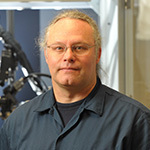
Notre Dame has received funding for a dual-source single crystal X-ray diffractometer. The new instrument will be equipped with high-flux Cu and Mo microfocus X-ray sources, a CPAD detector, and a cryogenic device. The instrument is jointly funded by the National Science Foundation’s Major Research Instrumentation and Chemistry Research Instrumentation Programs. This new instrumentation will ensure that Notre Dame continues to be at the leading edge of structural science.
For nearly 40 years, Notre Dame has been a leader in the field of X-ray diffraction through its Molecular Structure Facility, currently headed by principle investigator Allen Oliver, Research Professor in the Department of Chemistry & Biochemistry. Single crystal X-ray diffraction is the ultimate analytical technique to determine the composition and arrangement of atoms in materials. Perhaps most rewarding is determining the structural model of a new compound that a researcher has formed by their own hands. It is truly inspiring to be the “first to see” the physical shape and connectivity of a molecule never previously made.
This structural information is important for a myriad of applications, including the analysis of chiral organic compounds, pharmaceutical precursors, organometallic and inorganic complexes, and mineral-like materials. The majority of work in the facility is centered on four general areas: catalysis – development of new catalysts with less environmental impact and cost, bio-inspired and supramolecular materials – electron transfer systems and biomaterials, metabolism – characterization of carbohydrates and triple-helix RNA fragments, and energy and batteries – metal compounds for energy storage and utilization.
Approximately 35% of all chemistry graduate students, and 20% of chemistry undergraduates at Notre Dame use the facility, in addition to students from other departments within the university. The facility also supports collaborations with other institutions, including Tennessee Tech University, St. Mary’s College, Elizabethtown College, the University of Victoria, B.C., and a number of private sector organizations.
The new instrument will enable Notre Dame to continue this important work and build on past success to further research endeavors across campus. Furthermore, access to modern instrumentation is crucial for training an experienced, informed, and scientifically-nimble generation of researchers.
Originally published by at chemistry.nd.edu on September 27, 2022.